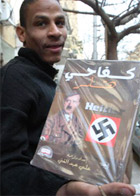Whose Holocaust?

For much of Europe, today is the UN-designated International Holocaust Remembrance Day. Secretary-General Ban Ki-moon has dedicated his address this year to children murdered by the Nazis, with the message that "the best tribute to the memory of these children is an ongoing effort to teach the universal lessons of the Holocaust, so that no such horror is visited upon future generations."
His message is surely commendable, but seasoned observers of the UN will be wise to the subtext of the phrase "universal lessons." One may note, for instance, that the Holocaust is increasingly spoken of not as the singular apogee of human evil, but in tandem with more recent genocides: Darfur, Bosnia, Rwanda. At best, memorial initiatives have shifted their focus away from Europe's decimated Jews and toward the concomitant persecution of homosexuals, Roma, and the mentally or physically ill. At worst, Palestinian activists have appropriated the memorial day to belittle Jewish victimhood and criticize Israel.
Here, Jewish Ideas Daily presents seven features from our archives that examine questions of post-Holocaust memory and tribute. In thinking about the Nazi legacy in Germany and the Arab world, places and days of commemoration, and the trivialization of the Holocaust for homiletical use, our writers ask the honest questions: what is being remembered, by whom, and for what purpose?
_____________
Holocaust Days
Yesterday [January 27, 2010], Shimon Peres delivered an address, in Hebrew, before the Bundestag as Germany and other nations marked International Holocaust Day, commemorating the date in 1945 when Soviet forces arrived at Auschwitz. Israeli and American Jews conduct their own Holocaust remembrances in the spring, on the anniversary of the Warsaw Ghetto uprising. Ultra-Orthodox Jews, uneasy with the Zionist emphasis on force and resistance, hold their memorials on the tenth of Tevet, one of the traditional fast days for the destruction of the Temple.
Israel and Western Guilt by Aryeh Tepper
Consider the evolving influence of the Holocaust on public perceptions of Jews. Viewed through Wilfred McClay's lens, the legacy of the Holocaust initially conferred upon the Jews a kind of perverse prestige as a certified victim class. But for how long? In retrospect, it was no doubt predictable that, once they came to wield state power, Jews would begin to cede their dubious place of honor as, so to speak, kings of the victims' hill.
Holocaust without End by Alex Joffe
Sixty-six years after the end of World War II, the Holocaust remains one of the central puzzles of human history. For Jews, the imperative is clear: to remember and to encourage others to remember. But remember what? Has the earnest dedication of both Jews and non-Jews to seek the meaning of the event and absorb its lessons ended by emptying it of meaning and lessons alike?
Kiefer's Challenge by Richard McBee
The German artist Anselm Kiefer has once again taken New York by storm. Ensconced at the prestigious Gagosian Gallery, Next Year in Jerusalem, his latest show, has met with reviews ranging from the gushing to the grudgingly respectful. To Roberta Smith, the veteran New York Times art critic, the massive exhibit, which closes December 18, is "possibly the best [Kiefer] has ever mounted in the city," even as Smith also comments, more caustically, that it amounts to "middlebrow art as catharsis, spectacle with a message."
It Isn't Even Past
The recent theft and recovery of the sign Arbeit Macht Frei from the gate of Auschwitz, and the emotional responses elicited by the incident, drive home just how deeply embedded the Holocaust and its imagery remain in contemporary consciousness.
Muslim Anti-Semitism
The prevalence of deep anti-Semitism in many parts of the Muslim world is one of today's scarier phenomena. To some, it can also seem mysterious. To be sure, Jews regularly suffered persecution under the Crescent as they did under the Cross, but not with the same sustained ferocity. Nor did Islam ever bring forth a racially-infused hatred of Jews like that of the Spanish Church—or, in our own times, the Nazis. Until, that is, the Nazis themselves got into the act.
Too Many Museums? by Diana Muir Appelbaum
Despite the proliferation of Holocaust institutions, and the millions of dollars poured into each new entry in the field (most recently in Los Angeles), their impact has been qualified. Many such museums, trying to address all human evil under the rubric of the Holocaust, strip the event of all necessary distinctions, turning the attempted genocide of the Jews into a generalized lesson about prejudice.
Comments are closed for this article.




